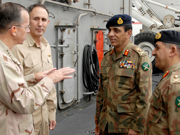 This article is part of a series examining the challenges of ending the conflict in Afghanistan. There is also a companion piece on the Taliban’s exclusion from the conference and the first part in the series.
This article is part of a series examining the challenges of ending the conflict in Afghanistan. There is also a companion piece on the Taliban’s exclusion from the conference and the first part in the series.
The Bonn II Conference on Afghanistan reviewed progress in the country since 2001, and promised international engagement after the withdrawal of most NATO military forces in 2014. One hundred countries and international organizations outlined their support for Afghanistan, including affirmations of support for “a decade of transformation” (2015-2024). What was missing in Bonn is equally, if not more, important than what occurred there. The decision of Pakistan not to participate in Bonn II left a gap among the regional countries important to any future peaceful settlement.
Key Conclusions
The interests of regional countries—the Central Asians, China, India, Russia, Iran and Pakistan—continue to be at odds with each other, and also, in certain cases, with the United States and NATO. Pakistan’s aspirations to preserve its interests along with its historic political, economic, and social links with Afghanistan make it fundamentally influential to stability. As the Pakistani military continues to dominate the country’s Afghan policy, without due consideration of its security concerns, especially vis-à-vis India, it is unlikely to encourage a negotiated settlement between the Taliban and Karzai government. The US-Pakistan relationship is now also being reviewed with the Pakistani military almost certain to demand that its concerns in Afghanistan be more greatly considered.
Analysis
While regional countries–Iran, India, China, Uzbekistan, Tajikistan, Russia, and others–all have various interests in Afghanistan, given the magnitude of their historic political, economic, and social links to each other, Pakistan’s aspirations to preserve its interests make it key for achieving stability in Afghanistan. Security concerns about India gaining influence in Afghanistan, along with Pakistan becoming further destabilized, remain fundamental concerns for Pakistan’s military, whose opinion dominates the country’s Afghan policy.
The Pakistani military continues to be deeply mistrustful of Hamid Karzai and the former Northern Alliance commanders who now dominate the Afghan government. This distrust is mutual and historical–Pakistan supported the Taliban in the 1990s, while India (and Iran) were supporting the Northern Alliance. Karzai and these former members of the Northern Alliance have at times been openly hostile to Pakistan, especially towards the military, blaming them for supporting the insurgency and undermining the Afghan government. Hamid Karzai also recently signed a strategic partnership agreement with India, which includes Indian training of Afghan army officers. India continues to expand its political and economic footprint in the country, seeking resources to fuel its economic growth, the creation of an India-friendly neighborhood, and limiting the ability of militant groups to use Afghanistan to attack India, as they have in the past. Pakistani officials fear an “anti-Pakistan Afghanistan” that could be used as a base by various secessionist, ethnic nationalist, and religious extremist Pakistani groups that could continue to destabilize the country.
Though the degree to which Pakistan influences and helps the Taliban is often exaggerated, including them in any political arrangement is seen by Pakistan’s key foreign policymakers as the most feasible option to ensure a Pakistan-friendly Afghanistan. Pakistani intelligence also holds a certain amount of leverage over the Taliban leadership, such as cracking down on leaders living in Pakistan or disrupting the Taliban’s logistics and financial supply routes. They are likely to assert this influence to ensure that they are not excluded from any peace talks.
Relations between the United States and Pakistan have continued their decline in 2011, especially following the November 26th NATO air strikes on two Pakistani military check-posts which killed twenty-four soldiers. Following this incident, Pakistan boycotted the Bonn conference, blocked NATO land supply routes through Pakistan (although air supply routes remain open), evicted the US military from an air base used for drone operations (although they are still present at other air bases), and announced a review of foreign policy towards the United States, including all civil and military counter-terrorism agreements.
Though political and media rhetoric in both countries is very negative and often highly uninformed about the other, both countries’ decision makers still accept the necessity of each other in stabilizing Afghanistan—and Pakistan—despite certain competing interests. The review of the relationship will see Pakistan, driven by its military’s interests, demanding a greater say in what happens post-2014 in Afghanistan, including involvement in peace talks, as well as limiting the role of India (to the extent possible) to, at most, assisting in economic development projects. The United States will continue to push Pakistan to “do more” to target Pakistan-based insurgents, using the leverage of aid, Congress, and the prospect of further international isolation.
As 2011 draws to a close, the peace and reconciliation process endorsed by the participants in Bonn faces many challenges. In addition to some seemingly intractable and difficult issues, there are divisions between actors about how to proceed, what to talk about, and what can and cannot be compromised upon. In addition to reconciliation among Afghans, a sustainable solution requires regional countries’ acceptance of the process. Though everyone—internally, regionally, and internationally—wants and sees a stable Afghanistan serving their interests, everyone also wants that stability on their own terms, which often are lethally opposed to each other.
About the photo: Pakistan Chief of Army Staff Ashfaq Kayani and Director-General ISI Ahmad Shuja Pasha with former US Joint Chiefs of Staff Chairman Admiral Mike Mullen. August 2008




